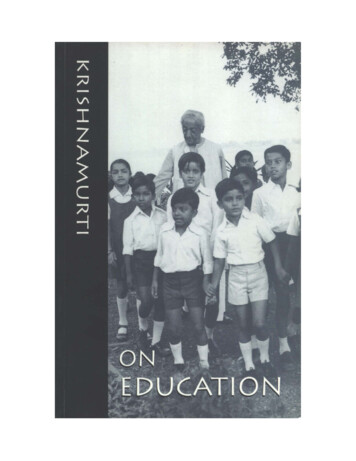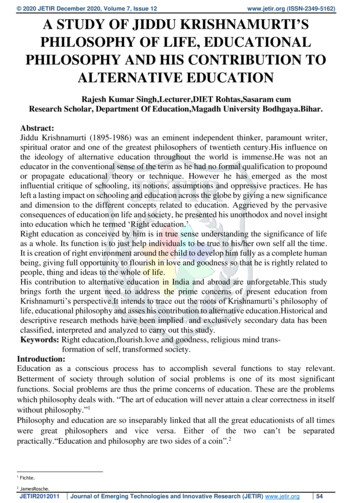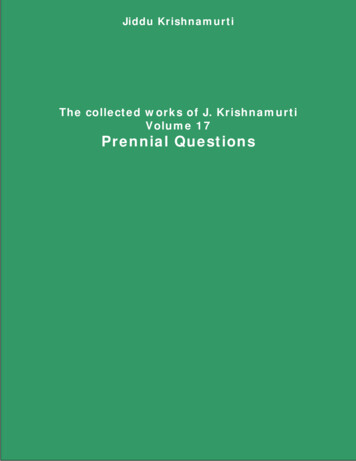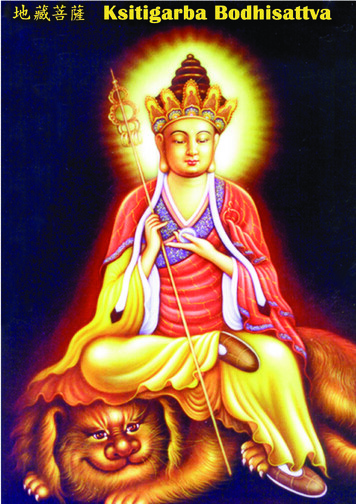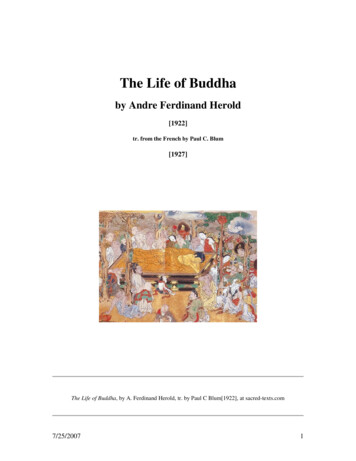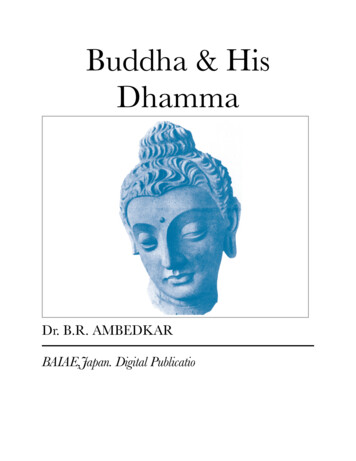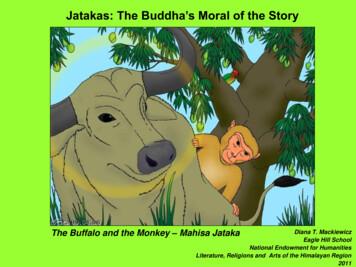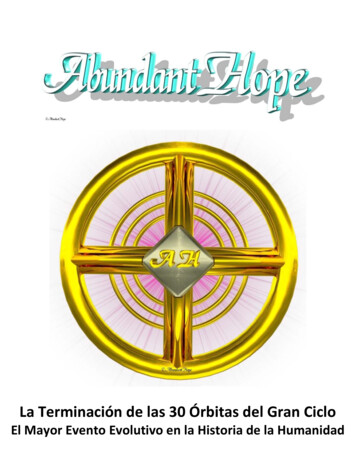
Transcription
--- what-Buddha-taught.net ---
REACHING THEGOODNESS WITHINA COLLECTION OF DHAMMA TALKS GIVENBY VENERABLE AJAHN UTHAI SIRIDHAROSTRICTLY FOR FREE DISTRIBUTION ONLYThis is to ensure that this intention for- the promulgation of the Dhamma for the benefit of all living beingsis achieved without hindrance.May all merit accrued help speed all beings to Nibbana.THIS BOOK IS A FREE GIFT OF DHAMMA AND MAY NOT BE OFFERED FOR SALE.ALL COMMERCIAL RIGHTS ARE RESERVED.PERMISSION TO REPRINT IN WHOLE OR IN PART OF THIS BOOK FOR FREEDISTRIBUTION AS A GIFT OF DHAMMA, HOWEVER, IS HEREBY GRANTED,AND NO FURTHER PERMISSION NEEDS BE OBTAINED.PRINTED COPIES OF THIS BOOK ARE AVAILABLE UPON REQUEST. INQUIRIESABOUT THIS BOOK MAY BE ADDRESSED TO:WAT KHAOYAI-CHAROENDHAM TAMBON PONG-DALONG,AMPHER PAK-CHONG NAKHON RATCHASIMA 30130,THAILAND.2
ContentsPrefaceA Short Biography of Venerable Ajahn Uthai SiridharoDHAMMA TALKSReaching the Goodness WithinUndertaking the task of liberating the HeartLaying a Foundation for the HeartFocus, Attention and AwarenessPlacing Our Attention InsideFrom Silence to Pure KnowingThe Dhamma Given to the Old BrahminGlossary3
PREFACEAt the request of Venerable Ajahn Uthai Siridharo's lay followers and with his consent,seven of his Dhamma talks delivered in Thai, have now been translated into English forthe benefit of people interested in the way to true happiness.Whenever possible, Pali language words have been translated into English. Thechosen translations, however, are only those English substitutes for the Pali words thatI feel are acceptable in their context within the talks; they don't necessarily reflect thePali words' original meanings. For the convenience of readers who wish to make theirown interpretations directly from Pali, I have italicized these translated termsthroughout the talks and listed them together with their corresponding Pali in theGlossary*.[*In this book, the meanings of italicized words and un-italicized words are defineddifferently. For example, "suffering" means "Dukkha" (as the reader can find out fromthe Glossary), while "suffering" has its usual meaning in the English usage.]In some cases, though, Pali words are left as they are because no suitable Englishwords can be found to substitute for them in their particular context. Such Pali wordsare capitalized and discussed in the Glossary if they haven't been explained byVenerable Ajahn Uthai in their immediate context. The words heart and mind are usedinterchangeably throughout these talks, as they are generally throughout Thailand; they bothrefer to the Pali word Citta. Please refer to Citta in the Glossary for a detailed explanation, Inaddition, I wish to draw the reader's attention to Venerable Ajahn Uthai's use of the word virtue(Sila), which has here a broader and deeper meaning than simply moral integrity or precepts.Venerable Ajahn's concept of virtue can be found explained in the third talk.Venerable Ajahn Uthai's original discourses have been paraphrased where this hasbeen necessary to improve readability and to highlight major points. Because of that,and despite efforts to preserve his original style of speaking, some of the flavor of histalks may have been lost.Many people have helped in the realization of this book. In addition to the support andassistance from the community at Wat Khaoyai-Charoendham, Jotika Dhammasaraput a great deal of work into improving the language, as well as making detailed,constructive comments and suggestions facilitating improvement of the accuracy andclarity of the translation. Ajaan Nanadhammo, together with Dahako Bhikkhu, spenttime comparing the translation against the Thai, correcting errors, further polishing thelanguage, and suggesting changes in the rendering of technical terms. Finally I would4
like to express my thanks and gratitude to a person (who wishes to remainanonymous), who read different incarnations of the manuscript, offered his advice onhow to improve them, and has been always ready to help when I needed guidance inthe course of preparing this book. The finished book owes a great deal to all of them:the book would not have been completed without their kindness, generosity and energy.Any mistakes that remain, however, are my own responsibility. I ask forgiveness fromour readers for any inadequacies in the translation.I hope that despite any remaining errors, our readers will nevertheless find theDhamma presented here inspiring, and will thus be encouraged to put forth the effortrequired to liberate their hearts.Dhammattho BhikkhuFebruary, 20095
A Short Biography of Venerable Ajahn UthaiVenerable Ajahn Uthai Siridharo was born in the province of Yasoton, Thailand, onMarch 12, 1936. After he finished the fourth grade, which was the highest educationone could receive in rural areas at that time, he left school and helped his parents workin the rice fields and orchards.VENERABLE AJAHN FAN ACHARO (1899-1977)VENERABLE AJAHN UTHAI SIRIDHARO (1936 -)At the age of 21, he ordained as a Bhikkhu (Buddhist monk) in Amnat CharoenProvince on May 9, 1956. After spending 3 rains retreat in Yasoton, he started to travelin search of a meditation teacher. At first he stayed with Venerable Ajahn Sim andVenerable Ajahn Wein in the province of Sakon Nakhon for 2 rains retreats (19591960). Then he went to train with Venerable Ajahn Fan Acharo, who stayed in SakonNakhon Province at that time, practicing under the guidance of Venerable Ajahn Fan6
until Venerable Ajahn Fan passed away in 1977. Venerable Ajahn Uthai then soughtsolitude at Wat Tumphra-phuwua in the Nong Khai Province, spending his rainsretreats there regularly.At the invitation of Venerable Ajahn Maha Boowa, Venerable Ajahn Uthai came to theprovince of Nakhon Ratchasima in early 2006 to help establish and develop WatKhaoyai-Charoendham as a Dhamma center for the region of central Thailand. He hasresided there since then.A view from Wat Tumphra-phuwua in the Province of Nong Khai.This picture was taken when Venerable Ajahn Maha Boowa (left) came to attendthe robe-presenting ceremony at Wat Khaoyai-Charoendham in the province ofNakhon Ratchasima on October 22, 2006. Venerable Ajahn Uthai is on the right.7
At the request of the translator, Venerable Ajahn Uthai agreed to have picturestaken when he was sitting in meditation (the above) and doing walking meditation(next page), to be used as guiding examples for people who are interested inmeditation. These photos were taken near the meeting hall at Wat KhaoyaiCharoendham one afternoon in late November, 2008.8
REACHING THE GOODNESS WITHIN Just as trees cannot sustain themselves without soil, nor buildingsstand without being supported by a foundation, all the goodness in theworld cannot manifest without a sense of goodness and well-being withinthe heart .VENERABLE AJAHN UTHAI, SEPTEMBER 6, 2008Now let us train ourselves to sit in meditation to calm our minds. If you don't trainyourselves to calm the mind through meditation, it will be constantly occupied withthinking except when you're asleep. This continual thinking all day long consumes agreat deal of energy. If the mind is not made strong, it easily becomes exhausted. Thenyou will feel tired - not only will your body feel tired but also your mind. That's whysitting in meditation is a good thing to do. Resting in peaceful meditative states not onlynurtures and energizes our minds but also brings goodness into our hearts.Everyone admires goodness and, by nature, everyone likes things that are beautifuland orderly. The path of practice leading to freedom as taught by the Buddha, is itself,nothing but a strategy of refining, tailoring and polishing things up to make themgraceful and elegant. We all know how to make things beautiful, don't we? We havedone whatever is needed to make our bodies pleasant to look at. But this is only goodon the external level. The work would be incomplete if we simply stopped right there.To complete the work, we need to refine our minds as well. All of the Buddha'steachings point to the importance of the mind; he advised bringing wholesomeness(Punna) and skillfulness (Kusala) of the mind to perfection.Wholesomeness refers to the ideal state of mind. What then are the characteristics ofthis ideal mental state? When the mind is in its ideal state, it is pleasing to view. It isbright, beaming, joyous and light - all of these qualities are natural treasures of themind. Actually, we can tell instinctively whether the characteristics of wholesomenessare present or not when we look in the mirror: if at that very moment, we recall aperson who had been kind and generous to us, or a dear friend who cares about us as soon as we remember such a person, we are in touch with inner goodness. At sucha moment, we will see in the reflections those characteristics in ourselves.When our mind is directed to that which is wholesome, we naturally incline to adwelling place in goodness; the goodness then manifests itself externally, making usappear bright and cheerful: as described in a Thai saying, "The heart radiates a smile",which is noticeable to others when they look into our eyes. It is impossible, of course,9
to be looking into a mirror all the time, so the Buddha taught that we should developself-awareness, supported by mindfulness and discernment, as an internal mirror toexamine ourselves: we watch our actions, behavior and manners through this mirror,rather than an external one, to ensure that they are appropriate and pleasing to the eye.If you don't use mindfulness and discernment, the inner mirror, to keep track of yourmind, it will wander about instead of staying with goodness. Consequently, you willforget to control your behavior, to the point where it is no longer respectable.The Buddha taught us to practice meditation as a skillful means for tuning the mind.Through meditation, we tune the mind to make it align with goodness: adjusting it byrecalling what goodness and well-being feel like and nurturing it to align with thatfeeling. If your mind is not currently in good condition, tuning it in this manner will getyou out of trouble. If your heart is not at ease, if you are unhappy, then fine tuning likethis - continually centering your attention on the feeling of goodness and a sense ofwell-being, will calm the anxiety and stress. The natural intelligence that knows how totune the mind by being selective in our focus of attention (Arammana), is calledskillfulness (Kusala).In this way you train yourself to remain constantly mindful in every posture and activity,continually alert to the thoughts and emotions arising in your mind; with discernment,you choose to stay with the feelings of goodness, the mind objects that make you feelbright, buoyant or happy - this is what skillfulness is about. We can be skillful like thiswhen our minds are sustained by the strength of mindfulness, concentration anddiscernment.Skillfulness also includes the intelligence that knows how to abandon unskillfulthoughts and emotions, which are alien to the true nature of the heart. Seeing thatunskillful thoughts and emotions are simply passing events concocted by your greed,hatred and delusion, you turn away from them and incline your mind towards pureknowing instead; you stay vigilant and heedful, letting these unskillful thoughts andemotions pass through and disappear from the mind whenever your awarenessencounters them. You don't hold on to them or pile them up to burden your mind.Rather, you filter them all out through mindfulness and discernment - regardless ofyour nationality, gender, status or age, this will be a wholesome and skillful thing to do.What standards can you rely upon as the basis for making all your judgments? Whereis Vihara-dhamma - the abiding or basis you can trust as a guideline for conductingyour life? You have houses filled with furniture for resting the body, but if you don'thave a place for resting the mind - if a sense of well-being is missing and you don't feeljoyous and optimistic - then what is the point in acquiring a large house or grandmansion for resting the body? The large house or mansion would simply be a pointlessluxury - it wouldn't alter the fact that the mind is weighed down by trouble and suffering.In attempting to find a resting place for the mind, you have to rely upon Dhamma,10
which starts with virtue (Sila), as your guide. Virtue and all other levels of Dhamma(Sila-Dhamma) will always point you back in the direction of wholesomeness andskillfulness; and as you have learned by now, resting your mind in goodness, or asense of well-being within, is a wholesome and skillful thing to do. When we keepbringing up the feeling of goodness in our hearts, nourishing a sense of well-beingwithin, brightness, cheerfulness and coolness will all arise and become our treasuresas a result. These treasures can be compared to the light that emanates from a flame:brightness, cheerfulness or coolness is emitted from the goodness and sense of wellbeing within just in the same way as light radiates from a flame.When Thai teachers, parents, or grandparents instruct young people, they oftenconclude their exhortations with words such as, "Look, my son; be intent on what youare doing. Be firm in putting forth your effort." Even so, most people hearing this advicedon't see any point. Now you are listening to the Dhamma; you are listening to thetruths. But in order to penetrate the meaning, you have to put forth effort in yourpractice as well.After recognizing the importance of establishing the mind in goodness and a sense ofwell-being, you should start training yourselves to develop it. When the mind finally hasa place in which to rest, the goodness will then be able to grow and develop.Just as trees cannot sustain themselves without soil, nor buildings stand without beingsupported by a foundation, all the goodness in the world cannot manifest without asense of goodness and well-being within the heart. Seeing the value of a foundation,we should try our best to nourish and nurture it - this we can do by centering the mindon a meditation object as our focus of attention (Arammana).One approach commonly used is repeating the meditation mantra Buddho in our mind.When our focus is solely on Buddho, the mind will no longer be able to wander around;it will gradually gather and incline towards goodness and a sense of well-being. As wekeep repeating Buddho, our mind will become firm and stable; if we maintain the effortwithout interruption, the goodness and well-being will become firm and stable as well.This firmness and stability of the mind are its strengths - our inner goodness and senseof well-being are developed and elevated due to the power of these mental factors.To understand the Dhamma with clarity, you need to practice appropriately. As youtrain yourselves to rest in goodness and a sense of well-being within, remainingmindful like this continuously, you will be able to see your heart become luminous,bright and shining. Just as light radiates from a flame - when we rest in goodness anda sense of well-being within, brightness, cheerfulness and coolness will radiate fromour heart. If we can rest our hearts like this all the time, we won't have any worries orproblems. Problems arise only when we focus on things outside.11
When pain, fatigue or discomfort of any kind arises in your bodies, you should restrainyourselves, not sending your minds out to grasp at the discomfort; instead you shouldcontinue practicing directing your attention to goodness and the sense of well-beingwithin. If you give free rein to your minds, they will immediately focus on and grasp atthe discomfort in your bodies - that's when problems start.The truth is that we have experienced bodily discomfort every now and then since theday we were born. There is no way the body can escape from the invasion ofdiscomfort. The stiffness, fatigue or aching we are feeling in meditation right now is stilltolerable. When we think about the excruciating pain suffered by aged or seriously-illpeople, now, that's really pitiful, too much to bear! If you contemplate this in anintelligent manner, you will train yourselves beforehand, preparing yourselves for anysituation where you have no choice but to cope with excruciating pain.So if you have discomfort in your body at this moment, you should train yourself to seeit as a separate phenomenon from the mind - bodily discomfort is simply theenvironment of mind. Instead of paying attention to the environment, bodily discomfort,you should bring your focus inwards to look after the mind. We allow the mind to staywith the feeling of goodness: a sense of ease, a sense of well-being within. Or we cancenter our minds on Buddho to help bring up that feeling. This is the strategy fordealing with issues such as bodily pain - issues which come from our minds' immediateenvironment.In general, the same approach can also be applied to external issues. Really, noexternal issue is as important as you might think. They are simply peripheral conditionsthat our minds happen to be situated in; they are not so different from bodily discomfort,which is part of the natural environment for the heart. When coping with external issues- such as those involving society and the people around you - you should be intelligent,skillful and selective about your focus of attention: Instead of sending the mind out tograsp at external issues, you center it in normality, a sense of ease and well-beingwithin - this is the inner goodness that you can reach if you train yourselves followingthe Buddha's teachings.If you practice like this continuously, you will come to the realization that happiness canbe found within - the worldly pleasure derived from external objects is not your onlyoption. If you don't recognize this fact, you will always seek goodness and happinessexternally because they are all that you know. Goodness and happiness, however, canbe found not only in the world but also within our hearts. When we direct our attentioninwards, we will see that goodness, happiness and a sense of well-being - all thesecan be found in our hearts. Seeing this, we make every effort to develop these goodqualities to perfection. We choose to think, speak and behave in a way that nourishesand strengthens these good qualities, and avoid those activities that lead in theopposite direction. This is how you should train yourselves.12
UNDERTAKING THE TASK OF LIBERATING THE HEART. you abide taking good qualities of the heart as your principles,upholding the Buddha's teachings as the vehicle for conveying you tothe end of suffering - the problem of suffering can be solved, and itsremedy starts working right from the moment when you first resist theurge to think, instead of obeying the commands of greed, hatred anddelusion .VENERABLE AJAHN UTHAI, OCTOBER 22, 1983A monk was doing walking meditation on the roofed path by his hut at WatKhaoyai-Charoendham in the province of Nakhon Ratchasima.13
People who train themselves in the Dhamma and Vinaya should regard the training ofthe mind as their sole duty. Not having shape as material objects do, the mind ischaracterized by its ability to think, imagine, create scenarios and concoct things. Byitself, it cannot discern good from evil and has to rely upon such good qualities asmindfulness and wisdom as its tools. When mindfulness and wisdom are weak, themind tends to think, without control. Infiltrated by greed, hatred and delusion, it churnsup all kinds of thoughts which by and large lead to suffering and wrong-doing in theend. If you follow the desires dictated by these defiling tendencies, you won't begreeted with the happiness you are looking for. Instead, you will be struggling for sometemporary gratification, which is barely enough to sustain you on the journey ofsuffering, such a journey is doomed to be torturous and will not at all fulfill your desirefor true happiness and well-being.If you want to pursue a desire, please do it properly by pursuing desire that stands upto the inspection of mindfulness and discernment. Look at all of you who come here forinstruction: you each need to rely upon desire in order to continue practicing, don't you?The aspiration to liberate the heart from suffering is a noble desire. Desire of this typeis necessary for putting forth effort along the path to freedom. In the texts, it is calledChanda Dhamma - noble aspiration. You should reflect thus: are your desires inharmony with the goal and effort required for the practice? Or are they simply a matterof obeying the commands of your passion, aversion and delusion? In this world there isgood and evil; there are truths and deceptions - which will you choose? Surely you willopt for the good and the truths wherever possible? When not putting mindfulness anddiscernment into use, however, we tend to be deceived by our delusion and conceit,perceiving whatever we crave for as something valuable.It is sad to see that so many people are slaves to their defilements, the defilinginfluences of greed, hatred and delusion. Defilements never have sympathy for theirvictims; they simply continue piling up torments on top of the pains that have beenoppressing their victims, keeping them trapped in the cycle of birth-and-death. So youshould quickly act on any opportunity to free yourselves from the orders of thedefilements. You should not wait any longer to put the Buddha's teachings into practice,thereby destroying defilements and releasing your heart from the bondage of rebirth.The Buddha warned that, as long as our hearts are not free from defilements, weshould not trust our thoughts. An old saying, "Be watchful of your thoughts when alone,and be cautious about your speech while in a group", is quite true. Thoughts under thesway of defilements mostly incline towards evil, fabricating things to tarnish the heart.That's why the wise say, "Be watchful of your thoughts when alone". To be watchfulmeans putting mindfulness and discernment constantly on guard. Whenever you findyour thoughts sidetracked away from the practice, you should stop thinkingimmediately; and you do so with Khanti, patient endurance. Endure patiently andperseveringly, not giving in to the urge to think! Be determined not to entertain or chaseafter the thoughts instigated by defilements. Instead, you abide taking good qualities of14
the heart as your principles, upholding the Buddha's teachings as the vehicle forconveying you to the end of suffering - the problem of suffering can be solved, and itsremedy starts working right from the moment when you first resist the urge to think,instead of obeying the commands of greed, hatred and delusion.Among the tools that the Buddha recommends for subduing unskillful thought is Viriya,persevering effort or energy. If you don't want to go somewhere you are required to go,you nevertheless force yourselves to go; if you don't feel like doing something you haveto do, even so you press yourselves to do it. You hold on to good qualities of the heartas your treatment, looking up to virtue and all other levels of Dhamma as your guide. Inthis way the Dhamma principles you have been developing will have adequate groundon which to grow. Anyone who practices in this way will be able to appreciate thesignificance of these principles which arise from the training. If you don't recognize thevalue of good qualities such as persevering effort or energy, when will they start togrow and flourish in your hearts?Both the Buddha and our contemporary teachers who have witnessed the marvels ofthe Dhamma within their hearts always teach that, "A heart infiltrated by greed, angerand delusion is burning and painful day and night. Provoked by these defilinginfluences (defilements), one continues seeking the sights, sounds, smells, tastes,bodily sensations and mental objects without a break. What one obtains in the end,having pursued the rewards promised by the defilements, are just difficulty, pain andaffliction."If you don't train your heart - if you allow it to follow the lead of defilements, it will bebound to the round of rebirth because the heart never dies or disintegrates. As theBuddha had realized himself declared to us, "Deceived by defilements, a living beingcontinues trapped in the cycle of birth-and-death in various realms and worlds. If thecorpses and bones left behind by that being from various past lives were collectedtogether into a pile, its size would be bigger than that of a whole mountain." Thisstatement implies that the heart never dies or disintegrates. If the heart were to die ordisintegrate at some point - such as at the moment the body ceases to functionaltogether - how could the corpses and bones accumulate and be collected into a pilebigger than a whole mountain? We each have a body. One day, when our breathingstops and the heart leaves the body, our bodies will again become corpses - are youresigned to letting these corpses keep piling up endlessly?Precisely because taking refuge in defilements will keep one trapped in the round ofrebirth, causing endless suffering, we conclude that defilements never have sympathyfor their victims. Reflecting on this fact, we surely want to find an escape from theround of rebirth; taking up the training wholeheartedly, we hope that one day we will bereleased from the control of defilements, realizing full enlightenment (Nibbana) throughthe power of our practice.15
It's time to wake up! It's time to wake up from the delusion and stupidity of obeyingdefilements' commands. If you don't wake up now, you probably won't have anotherchance to wake up in the future. Your situation in this life is already an ideal one. Yourbeing reborn in this world indicates that you have performed meritorious actions anddeveloped perfections (Parami) in the past so you take on a life form complete withfavorable faculties in the human realm (Manussa-Sampatti). That is, you possess ahuman body and mind in healthy condition. Favorable faculties in the human realm isthe foundation for developing higher-level faculties such as favorable faculties in theheavenly realms (Deva-Sampatti) or favorable faculties for attaining Nibbana (NibbanaSampatti), the goal that you all are aiming for. As human beings, you already possessideal conditions for fully developing yourselves in the practice. You should be pleasedand proud of having this privilege, and take advantage of the opportunity readilyavailable here and now. There is no point in hoping for something better in a future life.In mentioning this readily-available opportunity, I recall that the Buddha used toencourage his disciples to take Chanda to heart as one Dhamma principle for trainingthe mind. Here Chanda refers to the attitude of taking an interest in the practice,including the places suitable for training the heart. Let's recall the places where theBuddha strove and attained enlightenment; let's look back on the places where theenlightened disciples put the Buddha's teachings into practice and achieved the goal;and let's call to mind the places where our contemporary teachers used to stay anddeveloped successfully in Dhamma and Vinaya! All of them are the places in which youshould put your trust. That is, you trust that they will be ideal places for developingyourselves in just the same way that they supported the Buddha, his enlighteneddisciples and contemporary teachers to develop themselves to the fullest. It is calledAkaliko Dhamma - the Dhamma is timeless. When you reflect on this, a sense ofardent aspiration will arise in your hearts because those places exist not only in thepast but also today.Among the places the Buddha praised as suitable for training the heart are caves, cliffs,forests and mountains. Look at the place that you are living in now, this monastery! It isquiet and secluded just like those praised by the Buddha; and your hearts are full ofgreed, hatred and delusion, not so different from that of the Buddha before he attainedenlightenment or those of his enlightened disciples before they witnessed the Dhamma.Your hearts and those of the Buddha and his enlightened disciples all have the samecharacteristics. They differ only in their levels of purity and nobility, which can berefined through the practice and training. Aside from purity and nobility, you cannot saythat there are fundamental differences between your hearts and those of theenlightened ones. As for the physical form, you each have a reasonably healthy body.There is no real difference between your bodies and those of the enlightened ones.Whatever conditions there might be that are suitable for the practice, you have them allhere and now - you shouldn't have any doubt about that! So where is the place tofoster faith, and where is the place to sow the seeds of aspiration for the practice. Of16
course, it's in the heart! The heart is the field for developing our faith and aspiration forthe practice. Our hearts suffer - and faith and aspiration for the practice are tools fordealing with the suffering of our hearts. We should make use of these tools whereversuffering appears.To treat the illness of suffering, you have to put the Dhamma principles into use; inaddition, you need to monitor your practice, making sure the Dhamma principles arebeing applied appropriately. Both should be done with mindfulness and discernment.For example, the Buddha taught letting go as a Dhamma principle - but from whatangle should we view this to understand the essence of letting go? What should we letgo of, and how do we verify whether we have truly let go? To overcome such doubts,we have to rely on the practice grounded in mindfulness and discernment, bringing allour awareness inward to observe the movements of our mind. Aside from mindfulnessand discernment, nothing else can adequately take care of our mind - no other toolscan be used to keep up with our mental states and discriminate bet
4 PREFACE At the request of Venerable Ajahn Uthai Siridharo's lay followers and with his consent, seven of his Dhamma talks delivered in Thai, have now been translated into English for the benefit of people interested in the way to true happiness. Whenever possible, Pali language words have been translated into English. The chosen translations, however, are only those English substitutes for .
